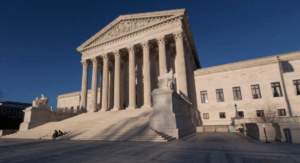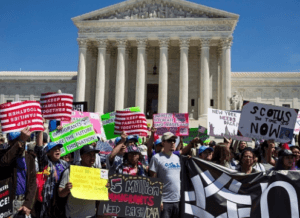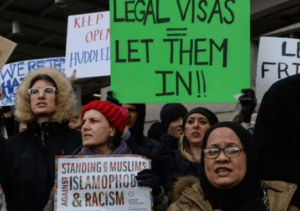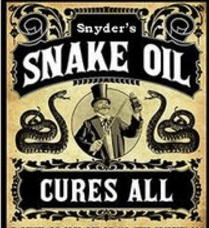
Supreme Court Approves Partial Travel Ban Until Further Hearing in October 2017
By Chris M. Ingram, LL.M., ESQ
News Today
Ok, so we have some news on President Trump’s Travel Ban. The Supreme court today rendered an interim ruling on the legality of President Trump’s Travel ban. Here is what the court decided pending a full consideration of the matter scheduled for October.
Partial Ban
For now, the Supreme Court has decided that President Trump can impose a partial travel ban to temporarily block migrants from the Sudan, Syria, Yemen, Somalia, Iran and Libya, unless the migrant has “a credible claim of a bona fide relationship with a person or entity in the United States”.

Are we busy uniting America or are we busy dividing America?
Scope of Partial Ban
Precisely what the Supreme court means by “….a bona fide relationship with a person or entity in the United States…’ is not clear. Whenever, there is ambiguity in any legal wording, clarity is only established after many lawsuits have been filed to create case law as to how the statement has interpreted by the lower courts.
For now, the common understanding is anyone from these countries who have relatives in the US, work in the US or business in the US lined up will not be affected by the partial travel ban. All those with no connections to the US whatsoever will fall under the ban.

The Partial Ban Will Not Apply to Any Immigrant with Some Connection to the US.
Another interesting point to note is that the travel ban by definition is a temporary ban that was written to last between 90-120 days. Thus, by the time the Supreme Court comes to render its decision it may ultimately decide not to because by then the temporary nature of the ban would have run its course and the matter could be considered by the Court as being moot – then time period of the ban has passed thus there is nothing to adjudicate. Some legal scholars have determined that waiting until October was a deliberate move by the Supreme Court to duck the issue.
The Establishment Clause vs.
Immigration and Nationality Act 1952
What the Supreme Court has to decide is the balancing of two Constitutional principles, one is the Establishment Clause which is the protection against any branch of government passing any laws that would discriminate against a person’s religion, race, etc. Thus, the so called Muslim Ban, as it was originally known, would be a clear violation of the Establishment Clause. However, under the Immigration and Nationality Act originally passed in 1952 the President clearly has the authority to block certain classes of aliens from entering the US.
Section 212(f)of the Immigration and Nationality (INA) Act 1952 provides, “Whenever the President finds that the entry of any aliens or any class of aliens into the United States would be detrimental to the interests of the United State, he may by proclamation, and for such period as he shall deem necessary, suspend the entry of all aliens or any class of aliens as immigrants or nonimmigrants, or impose on the entry of aliens any restrictions he may deem to be appropriate”.
Over the years, the courts have never held this law to be unconstitutional, as there is nothing in the wording that is discriminatory against any particular religion, or race, etc. So, because of this law the President does indeed have wide powers to determine who can come into America, but not if the way it is applied is in violation of the Establishment Clause.
Since President Trump has long been on record saying he wanted to ban all Muslims from the US for a period of time, “until we can figure what the hell is going on”, the lower courts have cited his rhetoric as being racially biased and thus, whilst the President has authority under Section 212(f), it cannot be used unconstitutionally as a weapon against any religion, inter alia. The Travel Ban 2.0. had all references to any religion removed and it was this version that the Supreme Court temporarily ruled upon today.
Bottom Line for Today
According to the Supreme Court’s interim ruling, all aliens within the countries named in the Travel Ban can come to the US as normal providing they have some connection to the US with a person or business, including Universities, etc.
The vast majority of aliens in the F-1, M-1, H-1B, EB1, EB2, EB3, O1, L-1A, E1, E2 and family immigration space will not be affected by this decision today.

Least we forget that the vast majority of Immigrants save American lives every day, love America and want to be part of the American Dream to Make America Great Again.
Will the Ban Save American Lives?
All of the studies into the issue as to whether the proposed ban will save American lives all point in the direction of “No”, because since 9/11, most terrorism acts are caused by nationals who were either born or raised in the country where they committed their act of terror. Moreover, no one from the listed countries in the ban has committed an act of terror in the US resulting any loss of life. The Boston Marathon bombers Dzhokhar and Tamerian Tsarnaev were raised in the US and were naturalized US Citizens.
The Orlando, Florida shooter who killed 49 people in a night club was an American Citizen. Since 9/11 it appears that virtually all acts of terrorism have been committed by Americans on Americans, same as in the bulk of Europe. Therefore, all of the studies that have been done by the Department of Homeland Security and other agencies have determined that any kind of travel ban or travel suspension will not add to the security of American, but more likely have the opposite effect, as more self-radicalized Americans will be incensed by what they see as an assault on their religion.

Snake oil, originally a fraudulent liniment without snake extract, has come to refer to any product with questionable or unverifiable quality or benefit. By extension, a snake oil salesman is someone who knowingly sells fraudulent goods or who is himself a fraud, quack, or charlatan.
The Supreme Court is not trying to decide whether the President’s Travel Ban has any merit on its efficacy. Indeed, the Supreme Court is only trying to decide whether the Travel Ban 2.0 as written violates the Establishment Clause.
The Supreme Court might privately feel that the Travel Ban will not improve American’s security, but as a matter of Constitutional Law, their job is to simply decide whether the President has the right to impose a “Travel Ban”.
We all want America to be safe, but experts say there is a smarter way to go about it. Let’s see how the Supreme Court rules in October. The good news for now is that all aliens with visas, or pending visas, or who are applying for visas who have some connection to the US should be able to complete their journey as normal.
By Chris M. Ingram., LL.M, ESQ.
Attorney at Law

Immigration Law Offices of Chris M. Ingram
US Immigration Law Offices of Chris M. Ingram
Chris M. Ingram LL.M., ESQ – Immigration Attorney
Admitted in New York.
Practice Specializing in US Immigration Law
401 Wilshire Boulevard, 12th Floor,
[Cross Streets 4th and Wilshire]
Santa Monica,
California 90401
Tel: 310 496 4292
.


Comments on this entry are closed.